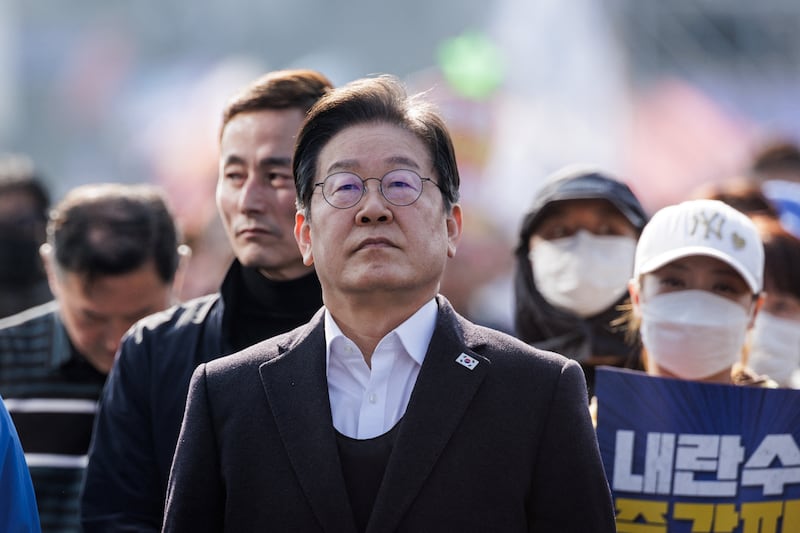Updated on April 4, 2025, at 1:50 p.m. ET
TAIPEI, Taiwan – South Korea’s Constitutional Court on Friday upheld President Yoon Suk Yeol’s impeachment, removing him from office following his short-lived imposition of martial law, and possibly paving the way for an easing of tensions with bitter rival North Korea.
Yoon was impeached by the opposition-controlled National Assembly in mid-December on charges of violating the constitution and other laws by declaring martial law on Dec. 3. He ordered troops to the National Assembly to stop lawmakers from voting against the martial law decree and the arrest of politicians, evoking an earlier era of authoritarianism in South Korea.
At that time, Yoon defended the move as a necessary act of governance. He cited threats from North Korea and purported “anti-state activities” by the domestic political opposition.
He called the martial law declaration a “highly calibrated political judgment” aimed at protecting the nation and restoring the normal functioning of the state, which he said had been paralyzed by the opposition.
The verdict, which was read by acting court chief Moon Hyung-bae, took effect immediately, requiring the country to hold a snap presidential election to pick Yoon’s successor within 60 days, which many expect to fall on June 3.
“The negative effects on the constitutional order and the repercussions from the defendant’s violations of the law are grave, making the benefits of protecting the Constitution by dismissing the defendant overwhelmingly larger than the national losses from dismissing the president,” said Moon.
Lee Jae-myung, leader of South Korea’s Democratic Party, or DP, is regarded as the top contender to succeed Yoon. The veteran politician lost to Yoon in the 2022 presidential election by the slimmest margin in South Korea’s democratic history.
Lee has offered limited details on his foreign policy agenda, but in recent media interviews he has advocated for a more balanced and pragmatic approach in managing South Korea’s relations with North Korea and with global powers, particularly the U.S., China and Japan.

On North Korea, Lee said he believed the current strategy has tipped too far toward confrontation. Relations between the two countries since the end of the 1950-53 Korean War have waxed and waned for decades between unremitting hostility and attempts at rapprochement.
While acknowledging the “hostile” nature of current inter-Korean relations, he argued in multiple media interviews that South Korea’s strong military and alliances – particularly with the U.S. and Japan – already provide sufficient deterrence.
Instead, he insisted on “communication and engagement” with the North, signaling a return to the approach of previous DP governments.
North Korean state media did not immediately report on Yoon’s removal in contrast to when former President Park Geun-hye was impeached in 2017. At that time, the North reported the Constitutional Court’s decision just two hours and 20 minutes after it was announced.
The U.S. State Department said Friday it respected the decision of the Constitutional Court and vowed to work with the acting president and prime minister, Han Duck-soo, to ensure continuity in the U.S.-South Korea alliance until a new president is elected.
Yoon, who began his career as a prosecutor in 1994 and rose to become South Korea’s prosecutor general in 2019, was elected president in 2022.
Throughout his term, he prioritized strengthening alliances with democratic nations, particularly the U.S. and Japan, while adopting a hardline stance toward North Korea.
Under Yoon’s administration, South Korea imposed more than 10 sets of sanctions on North Korea and vowed to “punish and retaliate” decisively against any acts of aggression from the North.
He garnered significant support from conservative factions in South Korea, particularly among people concerned about national security threats from North Korea and China.
Critics of Lee, meanwhile, have accused him of adopting a “subservient” stance toward China.
Lee stirred controversy during his 2022 campaign by saying: “Why do we care what happens to the Taiwan Strait? Shouldn’t we just take care of ourselves?”
He later clarified that his point was about diplomatic pragmatism and that South Korea should avoid worsening relations with China.
Hanging over Lee is his indictment on charges of orchestrating unauthorized remittances to North Korea.
Prosecutors allege that between 2019 and 2020, during his tenure as governor of Gyeonggi Province, Lee directed the Ssangbangwool Group to transfer US$8 million to North Korea, including US$5 million intended for a smart farm project and US$3 million to facilitate a prospective visit by Lee to Pyongyang.
Lee’s former deputy governor, Lee Hwa-young, was convicted and sentenced to nine-and-a-half years in prison for his involvement in the scheme, which encompassed bribery and unauthorized fund transfers to North Korea.
Lee denies any wrongdoing and says the charges are politically motivated. He contends that the prosecution’s case lacks merit and is an attempt to undermine his political career. The case is ongoing.
RFA Korean journalist Jaewoo Park in Washington contributed reporting. Edited by Stephen Wright.
Updated with U.S. State Department comment, no immediate reaction from North Korea.








